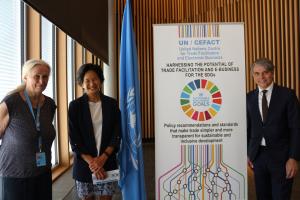
UNECE and the International Chamber of Commerce (ICC) Digital Standards Initiative (DSI) today issued a joint call to action to accelerate the adoption of globally interoperable standards essential for achieving digital trade worldwide.
The Call to Action was launched at UNECE-hosted 42nd Forum of United Nations Centre for Trade Facilitation and Electronic Business (UN/CEFACT) in Geneva – an event that highlighted the critical role that standardized digital trade processes play in enhancing global trade efficiency, reducing costs, and building digital trust at scale. The Call to Action follows the development of the ICC Key Trade Documents and Data Elements (KTDDE) framework and of UNECE’s UN/CEFACT Buy-Ship-Pay Reference Data Model and Trade Finance initiative.
The ICC KTDDE framework aims to establish a "single source of truth" for data, ensuring alignment, security, and efficiency as data moves across the supply chain. The UN/CEFACT Buy-Ship-Pay Reference Data Model is a business process holistic semantic data model that covers the entire international supply chain from trade, transport and regulatory perspectives. Together, they support the digitalization of end-to-end supply chains through standardized semantics, and can help create a more efficient, cost-effective, and interoperable global trade ecosystem.
"The KTDDE framework has demonstrated significant results from collaborative efforts between standards organizations, intergovernmental bodies, and industry leaders," stated Pamela Mar, Managing Director of ICC Digital Standards Initiative. "This joint call to action is the next critical step. It is essential for both the public and private sectors to commit to these standards to drive the digitalization of supply chains forward."
The ICC KTDDE framework and the UN/CEFACT Buy-Ship-Pay Reference Data Model and Trade Finance initiative benefit entities involved in the production, transportation, or sale of goods worldwide and provide value to governments and regulatory bodies considering trade digitalization legislation.
"From an industry perspective, businesses can start reaping benefits by working with the KTDDE toolset," noted Tom Shinya, IUMI Executive Committee Member and Member of the DSI Industry Advisory Board. "At the same time, we need to work hand in hand to develop digital data standards for remaining documents, including cargo insurance, which are less advanced in terms of digitalization. Continuous education and alignment are vital to support the widespread adoption of digital standards across all sectors and economies."
The call to action urges all stakeholders in digital trade to work together to align and drive interoperability at the data level to ensure seamless data flow using core data elements as connectors. Stakeholders are invited to submit their commitments and report them to the UN/CEFACT Plenary starting in 2025 and bi-annually thereafter.
The commitments should focus on implementing some of the following measures:
- Creating policies conducive to digital trade and uniform regulations;
- Aligning legal systems;
- Adopting globally interoperable standards for national border processes;
- Aligning data definitions and cross-referencing common standards for global interoperability, among others.
“In the current inter-connected global economy, standardized digital trade processes are key to enhancing global trade efficiency, reducing costs, building digital trust, and ensuring seamless integration into global supply chains. This is an extremely important area for transition economies, which still have limited integration into global trade processes,” noted Dmitry Mariyasin, Deputy Executive Secretary of UNECE.
"We are excited to announce several upcoming projects that will build upon the KTDDE framework," said Maria Teresa Pisani, Acting Chief of the Trade Facilitation Section at UNECE. "This includes updating the United Nations Trade Data Elements Directory (UNTDED) in collaboration with ISO and enhancing the Buy-Ship-Pay Data Exchange Structures for Trade Finance Facilitation. These projects are designed to further integrate digital trade processes and make standards work better for industry."
Over the years, through various inter-governmental bodies, and especially the work of the UN/CEFACT, hosted in the Economic Cooperation and Trade Division of UNECE has played a leading role in supporting the digitalization of global trade processes. So far, UN/CEFACT has developed around 950 e-business standards and guidelines, as well as some 50 global trade facilitation recommendations. These have provided standardized data models and frameworks to support efficient trade information exchange through tools, such as the Single Window Interoperability Framework and eCERT for electronic certification.

